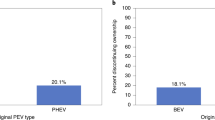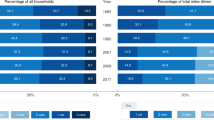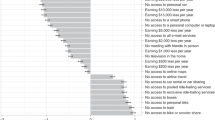Abstract
As most consumers do not have pre-existing knowledge of electric vehicles (EVs), and current market conditions favour petrol and diesel vehicles, car dealership experiences may strongly influence EV purchasing decisions. Here, we show that car dealerships pose a significant barrier at the point of sale due to a perceived lack of business case viability in relation to petrol and diesel vehicles. In 126 shopping experiences at 82 car dealerships across Denmark, Finland, Iceland, Norway and Sweden, we find that dealers were dismissive of EVs, misinformed shoppers on vehicle specifications, omitted EVs from the sales conversation and strongly oriented customers towards petrol and diesel vehicle options. Dealers' technological orientation, willingness to sell and displayed knowledge of EVs were the main contributors to likely purchase intentions. These findings combined with expert interviews suggest that government and industry signalling affect sales strategies and purchasing trends. Policy and business strategies that address barriers at the point of sale are needed to accelerate EV adoption.
This is a preview of subscription content, access via your institution
Access options
Access Nature and 54 other Nature Portfolio journals
Get Nature+, our best-value online-access subscription
$29.99 / 30 days
cancel any time
Subscribe to this journal
Receive 12 digital issues and online access to articles
$119.00 per year
only $9.92 per issue
Buy this article
- Purchase on Springer Link
- Instant access to full article PDF
Prices may be subject to local taxes which are calculated during checkout


Similar content being viewed by others
References
Kennedy, C. A., Ibrahim, N. & Hoornweg, D. Low-carbon infrastructure strategies for cities. Nat. Clim. Change 4, 343–346 (2014).
Needell, Z. A., McNerney, J., Chang, M. T. & Trancik, J. E. Potential for widespread electrification of personal vehicle travel in the United States. Nat. Energy 1, 16112 (2016).
Richardson, D. B. Electric vehicles and the electric grid: A review of modeling approaches, impacts, and renewable energy integration. Renew. Sustain. Energy Rev. 19, 247–254 (2013).
Muneer, T. et al. Energetic, environmental and economic performance of electric vehicles: Experimental evaluation. Transp. Res. D 35, 40–61 (2015).
Global EV Outlook 2017: Two Million and Counting IEA Publ. 1–71 (International Energy Agency, 2017); https://doi.org/10.1787/9789264278882-en
Noel, L., Brodie, J. F., Kempton, W., Archer, C. L. & Budischak, C. Cost minimization of generation, storage, and new loads, comparing costs with and without externalities. Appl. Energy 189, 110–121 (2017).
Berkeley, N., Bailey, D., Jones, A. & Jarvis, D. Assessing the transition towards battery electric vehicles: A multi-level perspective on drivers of, and barriers to, take up. Transp. Res. A 106, 320–332 (2017).
Tran, M., Banister, D., Bishop, J. D. K. & McCulloch, M. D. Realizing the electric-vehicle revolution. Nat. Clim. Change 2, 328–333 (2012).
Mersky, A. C., Sprei, F., Samaras, C. & Qian, Z. S. Effectiveness of incentives on electric vehicle adoption in Norway. Transp. Res. D. 46, 56–68 (2016).
Bakker, S. & Jacob Trip, J. Policy options to support the adoption of electric vehicles in the urban environment. Transp. Res. D. 25, 18–23 (2013).
Harrison, G. & Thiel, C. An exploratory policy analysis of electric vehicle sales competition and sensitivity to infrastructure in Europe. Technol. Forecast. Soc. Change 114, 165–178 (2017).
Vassileva, I. & Campillo, J. Adoption barriers for electric vehicles: Experiences from early adopters in Sweden. Energy 120, 632–641 (2017).
Egbue, O. & Long, S. Barriers to widespread adoption of electric vehicles: An analysis of consumer attitudes and perceptions. Energy Policy 48, 717–729 (2012).
Rezvani, Z., Jansson, J. & Bodin, J. Advances in consumer electric vehicle adoption research: A review and research agenda. Transp. Res. D. 34, 122–136 (2015).
Cahill, E., Davies-Shawhyde, J. & Turrentine, T. S. New Car Dealers and Retail Innovation in California's Plug-In Electric Vehicle Market. Working paper (University of California, Davis, 2014).
Dealers not always plugged in about electric cars, Consumer Reports’ study reveals (2014) (Consumer Reports, accessed 20 November 2017); https://go.nature.com/2Jj1u3m
Matthews, L., Lynes, J., Riemer, M., Del Matto, T. & Cloet, N. Do we have a car for you? Encouraging the uptake of electric vehicles at point of sale. Energy Policy 100, 79–88 (2017).
Axsen, J., Goldberg, S. & Bailey, J. How might potential future plug-in electric vehicle buyers differ from current ‘Pioneer’ owners? Transp. Res. D 47, 357–370 (2016).
Axsen, J., Bailey, J. & Castro, M. A. Preference and lifestyle heterogeneity among potential plug-in electric vehicle buyers. Energy Econ. 50, 190–201 (2015).
Overview of Incentives for Buying Electric Vehicles. 2016–2019 (ACEA - European Automobile Manufacturers Association, 2017).
Levering, P. Denmark is killing Tesla (and other electric cars). Bloomberg https://www.bloomberg.com/news/articles/2017-06-02/denmark-is-killing-tesla-and-other-electric-cars (2017).
Kester, J., Noel, L., Zarazua de Rubens, G. & Sovacool, B. K. Promoting vehicle to grid (V2G) in the Nordic region: Expert advice on policy mechanisms for accelerated diffusion. Energy Policy 116, 422–432 (2018).
Sovacool, B. K., Kester, J., Zarazua de Rubens, G. & Noel, L. Expert perceptions of low-carbon transitions: Investigating the challenges of electricity decarbonisation in the Nordic region. Energy 148, 1162–1172 (2018).
Den Nye e-Golf (Volkswagen Denmark, 2017); https://www.volkswagen.dk/da/modeller/e-golf.html
Mersha, T. & Adlakha, V. Attributes of Service Quality: The Consumers’ Perspective. Int. J. Serv. Ind. Manag 3, 34–45 (1992).
Noel, L., Zarazua de Rubens, G., Kester, J. & Sovacool, B. The Status and Challenges of Electric Vehicles in Finland- 2017 (Aarhus University, 2017).
Electric car sales grinding to a halt in Denmark. CPH Post Online http://cphpost.dk/news/electric-car-sales-grinding-to-a-halt-in-denmark.html (2017).
Nykvist, B. & Nilsson, M. The EV paradox - A multilevel study of why Stockholm is not a leader in electric vehicles. Environ. Innov. Soc. Transit. 14, 26–44 (2015).
Wilson, A. M. The role of mystery shopping in the measurement of service performance. Manag. Serv. Qual. Int. J. 8, 414–420 (1998).
Kwet Shing, M. & Spence, L. J. Investigating the limits of competitive intelligence gathering: is mystery shopping ethical? Bus. Ethics 11, 343–353 (2002).
Finn, A. & Kayandé, U. Unmasking a phantom: a psychometric assessment of mystery shopping. J. Retail. 75, 195–217 (1999).
Burnham, K. P. & Anderson, D. R. Model Selection and Multimodel Inference: A Practical Information–Theoretic Approach (Springer-Verlag, New York, 2003).
Acknowledgements
The authors are grateful to X. Lin and K. Probert for support in conducting some of the mystery shopping visits at dealerships. The authors are grateful to the Research Councils United Kingdom (RCUK) Energy Program Grant EP/K011790/1 ‘Center on Innovation and Energy Demand’, and the Danish Council for Independent Research (DFF) Sapere Aude grant 4182-00033B ‘Societal Implications of a Vehicle-to-Grid Transition in Northern Europe’, which have supported elements of the work reported here. Any opinions, findings and conclusions or recommendations expressed in this material are those of the authors and do not necessarily reflect the views of the RCUK Energy Program or the DFF. This project has also received funding from the European Union's Horizon 2020 research and innovation programme under grant agreement no. 730403 ‘Innovation pathways, strategies and policies for the Low-Carbon Transition in Europe (INNOPATHS)’. The content of this deliverable does not reflect the official opinion of the European Union. Responsibility for the information and views expressed herein lies entirely with the authors.
Author information
Authors and Affiliations
Contributions
The idea and design for the research was co-developed by all authors. G.Z.d.R led the implementation of the study. G.Z.d.R and L.N. conducted all field research and data analysis. All authors contributed to writing the paper.
Corresponding author
Ethics declarations
Competing interests
G.Z.R. and B.K.S. declare no competing financial interests. L.N. has a competing financial interest as a consultant in a start-up company that is establishing businesses to provide grid services from EVs. B.K.S. is on the editorial advisory board of Nature Energy.
Additional information
Publisher's note: Springer Nature remains neutral with regard to jurisdictional claims in published maps and institutional affiliations.
Supplementary information
Supplementary Information
Supplementary Tables 1–7, Supplementary References, Supplementary Notes
Rights and permissions
About this article
Cite this article
Zarazua de Rubens, G., Noel, L. & Sovacool, B.K. Dismissive and deceptive car dealerships create barriers to electric vehicle adoption at the point of sale. Nat Energy 3, 501–507 (2018). https://doi.org/10.1038/s41560-018-0152-x
Received:
Accepted:
Published:
Issue Date:
DOI: https://doi.org/10.1038/s41560-018-0152-x
This article is cited by
-
Global declarations on electric vehicles, carbon life cycle and Nash equilibrium
Clean Technologies and Environmental Policy (2023)
-
Optimal production strategy for auto manufacturers with government subsidies in competitive environments
Frontiers of Engineering Management (2023)
-
Revisiting the promise of carbon labelling
Nature Climate Change (2022)
-
The role of energy infrastructure in shaping early adoption of electric and gasoline cars
Nature Energy (2021)
-
Crafting strong, integrated policy mixes for deep CO2 mitigation in road transport
Nature Climate Change (2020)



